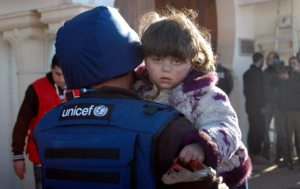Rebuilding Syria: Addressing Poverty Amidst Conflict
 Since the Syrian Civil War began in 2011, the country has been facing a massive humanitarian crisis. With the recent fall of Bashar al-Assad and his regime in early December, Syria’s future remains uncertain. Assad’s regime maintained power through oppression, murder and torture, suppressing the 2011 uprising with backing from Russia and Iran. The conflict in Syria has led to “the largest refugee and displacement crisis,” affecting millions of people within Syria and in neighboring countries. While the focus is on developing a democratic, transitional governing body in post-Assad Syria, emphasis and attention must not be diverted from the humanitarian aid and development initiatives that are addressing the severe poverty and instability faced by Syrians.
Since the Syrian Civil War began in 2011, the country has been facing a massive humanitarian crisis. With the recent fall of Bashar al-Assad and his regime in early December, Syria’s future remains uncertain. Assad’s regime maintained power through oppression, murder and torture, suppressing the 2011 uprising with backing from Russia and Iran. The conflict in Syria has led to “the largest refugee and displacement crisis,” affecting millions of people within Syria and in neighboring countries. While the focus is on developing a democratic, transitional governing body in post-Assad Syria, emphasis and attention must not be diverted from the humanitarian aid and development initiatives that are addressing the severe poverty and instability faced by Syrians.
The Role of International Aid
As of 2024, the European Union (EU) highlighted that more than 16 million Syrians require urgent assistance. Food insecurity, economic collapse, disease outbreaks, and the devastation of infrastructure have compounded the challenges of mass displacement. The EU, with its Member States, has become the largest donor of humanitarian aid to Syria, ensuring essential services including food, healthcare, and shelter
Similarly in December, the United Kingdom, with international humanitarian agencies, recently revealed plans for a £50 million package of humanitarian aid for Syria and its neighboring countries. These funds are vital for providing immediate relief while laying the groundwork for long-term recovery, poverty reduction and rebuilding Syria. The success of such initiatives depends on their alignment with local needs and their ability to adapt to the dynamic situation on the ground.
Economic Empowerment Initiatives
Several economic empowerment programs are in place to ensure the security of Syrians. Initiatives such as job training, micro-finance and entrepreneurship schemes offer pathways to self-reliance. Both national and international organizations have implemented and supported projects that enable families and groups to earn an income despite poor conditions and limited resources. In 2023, USAID’s Syria Livelihoods Program provided technical and financial support to establish women’s centers across Syria to train 600 women entrepreneurs and support around 200 women-owned small businesses. By fostering economic resilience, programs address poverty and restore a sense of dignity and purpose among affected populations
Education: Rebuilding Futures for Syrian Children
Following the fall of al-Assad, Syria faces the great task of reconstructing its education system. As of 2024, UNICEF’s statistics reveal that 2.4 million Syrian children remain out of school, highlighting the pressing need to address educational disruptions caused by over a decade of conflict. Barriers such as overcrowded classrooms, insufficient resources and language barriers continue to hinder access to education and risk escalation of a “lost generation.” In the immediate aftermath of Assad’s overthrow, students across Syria began returning to schools, with the new leadership under Ahmad al-Sharaa, ordering schools to reopen as part of stabilization efforts for the nation.
Syria’s new education minister, Nazir Mohammad al-Qadri, announced that all educational references to the former ruling Baath party will be removed, but the school curricula will not otherwise be altered. The new administration has emphasized that girls’ right to education will remain unrestricted, ensuring education for all groups continues without interruption.
Additionally, Syrians who graduated from Turkish universities are taking key roles in the post-Assad administration in rebuilding Syria and increasing bilateral connections. Education is not only a pathway to literacy and numeracy but also a foundation for social stability and economic recovery. Sustained investment and international cooperation remain essential to ensuring that every child has access to quality education in the process of rebuilding Syria.
Diaspora Contributions
The Syrian diaspora is essential in alleviating poverty and supporting reconstruction efforts. From remittances sent to families in Syria to the establishment of NGOs, the diaspora has been instrumental in providing financial and logistical support. Throughout the conflict in Syria, diaspora communities have continuously demonstrated their willingness to leverage their experience, knowledge, assets and resources in support of Syria and Syrians, serving as a bridge between local communities and international donors, and ensuring that aid reaches those that need it the most. The main question for Syria’s transitional phase is how, rather than if, the Syrian diaspora will engage with its homeland in the aftermath of the conflict.
Advocating for Policy Change
The Syrian crisis underscores the importance of foreign aid policies and international support for long-term development assistance alongside emergency aid. Without comprehensive policies that integrate humanitarian and development goals, efforts to reduce poverty and rebuild lives will remain fragmented and insufficient. The road to rebuilding Syria is long and fraught with challenges. Still, the combined efforts of international aid organizations, economic empowerment programs, education initiatives, and the Syrian diaspora offer a look into a successful future. Addressing poverty and rebuilding Syrian lives amidst conflict requires a multifaceted approach that prioritizes both immediate relief and sustainable development.
– Isobel Hurst
Isobel is based in Manchester, UK and focuses on Good News and Politics for The Borgen Project.
Photo: Flickr
